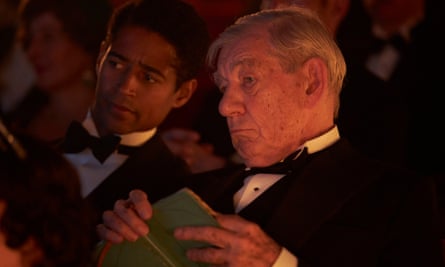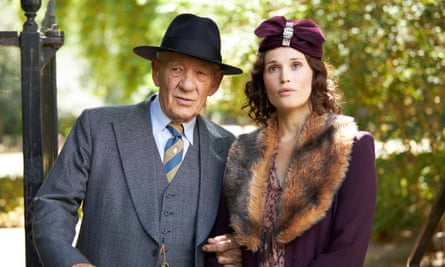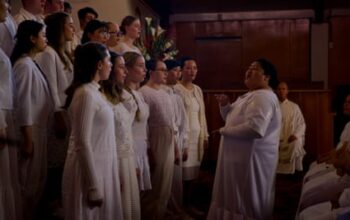‘The friendship between a critic and an actor violates a boundary’
Arifa Akbar
Oh, how I’d love to take bubble baths in the morning, long lunches at my club in the afternoon and arrive in the stalls by evening with my secret lover-cum-amanuensis and pencil-carrier in tow. Jimmy Erskine (Ian McKellen), chief drama critic of the Daily Chronicle, really does have it good. My quotidian reality as chief theatre critic of the Guardian cannot compare: a supermarket sandwich wolfed down before the bell, a frantic filing of copy after the curtain goes down (from a bench by the loos at Waterloo station on one occasion), or eating biscuits at my laptop into the small hours if it is a morning deadline.
But then, Erskine is an acid-tongued anachronism, part of a dying “old guard” even in the 1930s of the film. His portrait still contains a kernel of historical truth, though: Erskine is part of a bygone era when a single, revered critic held godlike sway over public opinion. His real-life counterparts were many, from Kenneth Tynan to “Butcher of Broadway” Frank Rich, whose most scabrous notices could close a show.
Those imperious emperor-critics are no more, their unilateral power diluted by the growth of the internet, with its mix of theatre vloggers, TikTokers, and other online critical voices who represent different ways of reviewing a show. And isn’t this a good thing? All of it makes criticism broader, less monolithic, although the power of some negative newspaper reviews can still dent ticket sales.
Erskine is a cartoonish archetype of the evil critic, a Mephistophelean figure who is having his portrait drawn for “immortality” (the shadow of Oscar Wilde’s Dorian Gray looms large) and more than a little reminiscent of Addison DeWitt, the manipulative theatre critic in All About Eve. But how evil is he before Nina Land (Gemma Arterton), an actor desperate for his validation, pursues him for praise?
We’d certainly consider him a dinosaur nowadays for his personal digs about Nina’s body and his bitching tone. That wouldn’t (and shouldn’t) be allowed. But in essence, there is bald honesty to his savagings of her wooden over-acting. She sees it as cruelty, he as rigour. The love-hate relationship between some actors/writers/directors and critics is well captured.
Critics might be seen as charlatans or the devil incarnate until they write a glowing review, and then they become gimlet-eyed truth-tellers. As exaggerated as Erskine is, there is a ruthless honesty to his write-ups at the start of the film which is admirable, and essential for a critic. He has an absolute love of his craft, too. “Theatre is life itself,” he says, and I see his obsessive passion reflected in the best critics around me.
His editor commands him to be kinder and this intrusion would rankle any critic today. It is true his verbal assassinations are hurtful. My rule is to express negative opinion in language I would use if the director or actor were in front of me. But Erskine’s style is built on waspish wit and elegantly formed put-downs, legitimate in their own right. The theatre industry may not like it, but some might argue it is its own art.
Where the film is at its most instructive is in its warning against the transgressive relationship that forms between Erskine and Land. All About Eve warns against this, too, likening it to a devil’s pact. The Faustian bargain between Erskine and Land is more carnal but it amounts to the same thing: friendship between a critic and an actor is violating a boundary, and it leads Erskine to lose his integrity.
If Land lived in the present, she might have sent Erskine an anguished email written at 3am (which critic hasn’t had one of those?) that he could simply have deleted. His fatal mistake is to engage with her out of pity, inviting her to his home, giving her advice on how to do better. Erskine isn’t the first critic to be hounded by an angry actor. I speak from experience. Where reviewers in other art-forms usually remain at a safe distance from those whose work they appraise, theatre reviewers are forced into close proximity every opening night.
Any of us can lose our critical distance, maybe even our moral compass, if we cross the line, get too close, start to cheerlead rather than critique. It is, ironically, his initial kindness that leads Erskine to his doom. Graham Greene spoke of a splinter of ice at the heart of every writer. It is the same for the critic, in my view. Erskine shouldn’t have let his melt. A lesson to us all.

‘If you are mealy-mouthed, readers will spot it: if you are honest, you may lose a friend’
Michael Billington
How lifelike is the current movie, The Critic? In most respects, it is miles away from the humdrum existence of today’s aisle-squatters. Set in 1934, it conjures up an era when the theatre critic was a journalistic star dictating his reviews – and in those days it was always a man – to an obliging amanuensis: it reminds me of a comment by Joseph Mankiewicz, who created the unforgettable Addison DeWitt in All About Eve, that “critics have acquired all the managerial trappings of performers”.
If the movie’s Jimmy Erskine, memorably played by McKellen, is a celebrity, he is also a risk-taking gay man in an age of punitive sexual laws. But, if much has changed since the 1930s, there are moments when the movie expresses a fundamental truth about critics and others when it dwindles into melodrama.
Patrick Marber’s Jimmy is loosely derived from a character in Anthony Quinn’s excellent novel, Curtain Call, who in turn was very closely based on James Agate, the Sunday Times theatre critic from 1923 to 1947. It is fair to say that McKellen doesn’t look much like Agate: a chunky figure in a loud-checked overcoat, whom Kenneth Tynan once told me resembled “a suspiciously clean farmer”. But between them Marber and McKellen accurately capture certain aspects of the critic’s life, from the compulsive note-taking to the use of fancy adjectives that irritate sub-editors.
The one scene in the film that really resonated, however, was that where Jimmy faces the sack. Suddenly a man who has spent 43 years reviewing theatre is confronted by the prospect of empty evenings and unwanted opinions. Even a lucky beggar like myself, who retired voluntarily and who is still paid to pontificate, can understand what he feels.
Theatre-reviewing, as a colleague once remarked, is a drug; and, although I never had to go cold turkey, I still find kindly people sometimes address me with the solicitude normally reserved for addicts in permanent rehab. But ultimately Marber’s script is about the corrupting effect of power and this is where I think it misunderstands the critic’s dilemma. The fictional Jimmy relishes wittily savaging people he doesn’t know.
The problem critics face in the real world is the opposite: how to write honestly about people whom they do know. Even though I avoided showbiz after-parties, one can’t live like a monk and I sometimes found myself in the painful position of judging artists I had met socially. If you are mealy-mouthed, readers will spot it: if you are true to your reaction, you may lose a friend. I was never a close chum but for many years I had a genial relationship with Jonathan Miller until I heavily criticised one of his productions and after that he treated me as an enemy.
Tom Stoppard, himself a critic in the early 1960s, once wrote, “I never had the moral character to pan a friend. I’ll rephrase that. I had the moral character never to pan a friend.” That, rather than the naked power-hunger displayed in The Critic, is the issue we reviewers face on a regular basis.

‘Critics fraternising with the people they write about is a taboo, a red line, a no-no’
Ryan Gilbey
Quentin Tarantino has always been open about his youthful love of film criticism. He studied the reviews of the New Yorker’s Pauline Kael “like class assignments” and even made a fictional film critic one of the heroes of his wartime thriller Inglourious Basterds. Now that Tarantino has abandoned his plans to direct The Movie Critic, about a reviewer on a 1970s porno rag, those of us who make our living judging the work of others will need to look elsewhere for solidarity.
Not to The Critic, though. To the common assumption that we are parasites feeding on the failures and triumphs of others, this 1930s-set thriller adds a further insult: we are venal, self-serving ingrates who will stoop to blackmail and murder to cling on to our jobs. Perish the thought! Then again, a movie showing what critics really do in the cause of survival – sharing colleagues’ craven reviews and cockamamie predictions in WhatsApp groups, say, or flogging embarrassing stories about them to Private Eye – wouldn’t look half as dramatic on screen as hounding an enemy to suicide or drowning a blabbermouth in the bathtub.
Younger reviewers will marvel at the treatment doled out here to the esteemed drama critic Jimmy Erskine, played by McKellen. On press night, he is tended to by theatre staff, who spirit his coat away and reserve him a quiet space in the bar to collect his thoughts. Even more astonishing is the moment when actor Nina Land (Gemma Arterton), confesses that it was his reviews that first inspired her to tread the boards. Maybe there are budding artists out there today who, like Tarantino or Nina Land, are driven by the critics they read. If so, their ardour will probably be all the more robust for having survived the cultural downgrading of the informed critical voice by aggregate websites and star-ratings, not to mention the skulduggery of studios that have fabricated quotes and/or reviewers to publicise their output.
When Jimmy and Nina become friends and co-conspirators, it feels almost as shocking as the grisly turn the plot takes. After all, critics fraternising with the people they write about is a taboo, a red line, a no-no; it is impossible to do without the critical faculties becoming adulterated. Perhaps, then, The Critic is not at all the brickbat it first appears to be, but rather a cautionary tale to help steer modern practitioners away from sycophancy, hyperbole and partiality – a guide to What Not to Do.
The downfall of Erskine shows what can happen when the critic drifts away from passionate engagement with an art form and toward serving their own ego or currying favour, either with readers or subjects. It’s a lesson that remains pertinent today. The next time critics insist on tagging the very people they’re praising on social media, listen out for a gentle splashing sound: it’s the tears of Gilbert Adair, Manny Farber and Dilys Powell raining down from heaven.
Source: theguardian.com


